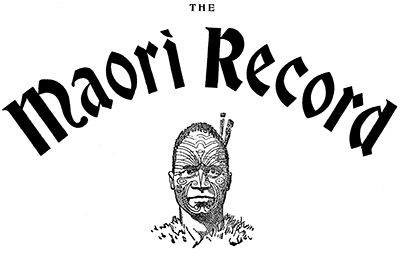- Magazines and Journals
- Explore
- Maori Record : a journal devoted to the advancement of the Maori people

Maori Record : a journal devoted to the advancement of the Maori people
Available issues
Background
Region
National
Available online
1904-1907
I ahu mai te whāinga o The Māori Record (1904-1907) i te ‘hiahia kia whakatakoto i ngā whakamau, i ngā hiahia me ngā wawata o te iwi Māori ki mua i ō rātou hoa Pākehā’ (Huitanguru, 1906: 1). Ko te whāinga o te pepa ko te kimi tautoko mō ngā whakamau o te Māori i te hapori Pākehā. Ko te tokomaha tonu o ngā kaiwhakawhiwhi ko ngā roia me ngā kaiwhakawā rānei o Aotearoa. He kaha te whakahē o The Māori Record i ngā kaupapahere whenua Māori o Tā James Carroll me tana kāwanatanga.
I utua ngā putanga tuatahi, pēnei i Te Puke ki Hikurangi, e te ariki wahine o te Wairarapa, a Niniwa-i-te-rangi. I utua ngā putanga o muri mai e Rangi Topeora, Kuini Wī Rangipupu (Mrs R S Thompson), me Wikitōria Taitoko. I whakatikaina The Māori Record e R S Thompson, i hokona ā-marama mō te 3 kapa ia kape, ā-tau rānei mō te 12 hereni me te 6 kapa, he mea utu tōmua.
Mai i te Ākuhata 1906, kei roto i te kara ko: Ka aroha hoki ngā Māori o Aotearoa, he wā anō he tangata nō Peretania, he wā anō he tauiwi noa, kei te āhua tonu o te kaingākau, o te pohewa rānei o tō rātou kāwana Peretania – GORST. Ko tēnei kara nō Gorst, te Kaiwhakawā Noho o mua o Waikato i te wā o ngā Pakanga Whenua o 1860, he mea whakaahua i te wairua o te niupepa me tana kaupapa o te whakanoho i te Māori ki tō rātou ake whenua. Ka kōrero te niupepa mō ngā rēti ka utua e te Māori mō tō rātou ake whenua pērā i ngā tāngata katoa o Peretania, engari hoki kāore rātou i whakawhiwhia ki te taitara hei āwhina i a rātou ki te kohi moni, ki te kohi pūtea āwhina mai rānei i te Kāwanatanga, hei whakawhanake i tō rātou whenua kia pāmu whai hua.
I muri i te hia tau, i mutu The Māori Record. I te pānui etita i te putanga whakamutunga i puta te kōrero: ‘Ina titiro whakamuri ki ngā tau e rua kua pahure ka kitea te pikinga o te āhua o ngā kaupapa whakahaere i ngā whenua Māori....Ko tā mātou kī noa iho, kua āwhina te RECORD ki te whakatinana i taua huringa' (Hune, 1907:99).
E hiahia ana te Puna Mātauranga o Aotearoa ki te mihi ki a Gail Dallimore mōna i tuku kōrero mai i whakamahia i roto i ngā tuhinga roa mō ngā niupepa Māori.
The aim of The Maori Record (1904-1907) came from ‘an earnest desire to place the grievances, desires and aspirations of the Maori people before their European fellow-subjects’ (February, 1906: 1). The paper's purpose was to generate support for Māori grievances from the Pākehā community. Many of the subscribers were members of the New Zealand Bar and judges. The Maori Record is critical of Sir James Carroll and his Government's Māori land policies.
The first issues, like Te Puke ki Hikurangi, were funded by the Wairarapa chieftainess Niniwa-i-te-rangi. Later issues were funded by Rangi Topeora, Kuini Wi Rangipupu (Mrs R S Thompson), and Wikitoria Taitoko. The Maori Record was edited by R S Thompson and was issued monthly at 3 pence per copy or 12 shillings and 6 pence per annum payable in advance.
From August 1906, the banner includes: It is the peculiar misfortune of New Zealand natives, that they are alternatively treated as British subjects, or as foreigners, according to the interest or caprice of their British rulers – GORST. This banner by Gorst, the former Waikato Resident Magistrate during the 1860 Land Wars, sums up the tenor of the paper and its theme of settling Māori on their own land. It refers to Māori people being charged rates for their land as were all British subjects, but at the same time not given clear title by which to raise money, or subsidies by Government, to develop their own land into productive farming units.
After several years, The Maori Record ceased. The editorial in the last issue notes: ‘Compared with two years ago the proposals for the administration of Maori lands are much improved....All we claim is that the RECORD has assisted in working the change’ (June, 1907: 99).
The National Library would like to thank Gail Dallimore for providing information used in essays about Maori newspapers.
Copyright statement
See our copyright guide for information on how you may use this title.
Acknowledgements
E hiahia ana Te Puna Mātauranga o Aotearoa ki te whakamoemiti ki te Department of Computer Science, University of Waikato, mō rātou i āwhina i te whakamamatitanga o tēnei taitara.
The National Library would like to thank the Department of Computer Science, University of Waikato for their assistance in the digitisation of this title.
 Log in
Log in